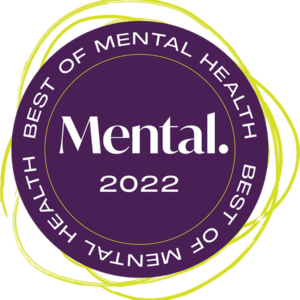Let’s be frank: Journaling’s gone viral, like a TikTok dance you don’t really want to do but kinda feel like you should. Well, take yourself off blast, because journaling is only for you if you want it to be. If you’re not a pen-and-paper person, no shame—but if you are interested, we’ll extol the ways the practice can support you.
“The way I have seen journaling be helpful for my patients is it can take the swirl of what’s going on in your mind and help you get it out,” says psychiatrist Pooja Lakshmin, M.D., founder & CEO of Gemma, the women’s mental health community, and author of Real Self-Care. “It also serves as a time stamp as you’re moving through different seasons of your life, where you can look back and remember, This is what I felt at this time. That can be useful in therapy, because you can see that you keep getting triggered in the exact same way when you talk to this one person.”
Where to start? That’s where our selections and pro tips come in. Rule #1 is matching the journal to the issues you’re looking to explore, which we do below with our six winners. Truth bomb: You could just bust out lined looseleaf and go to town.
“But I think it’s nice to have a journal because it helps you compile things,” says Lori Davis, Psy.D., clinical instructor of psychology in psychiatry at Weill Cornell Medical College in New York City. “And you can refer back to things over time and note progress made or things that you’ve worked through.”
Two bits of housekeeping before you start: Always use self-compassion, says Dr. Davis, and remember that “journaling is not a substitute for therapy, but another tool to help you clarify your thoughts and feelings.”
All products featured on Mental have been selected independently and editorially. When you buy from our links, we may earn a commission.
Best Journals for Anxiety
CBT-Style Journal
Therapy Notebooks The Anti-Anxiety Notebook, $30.40
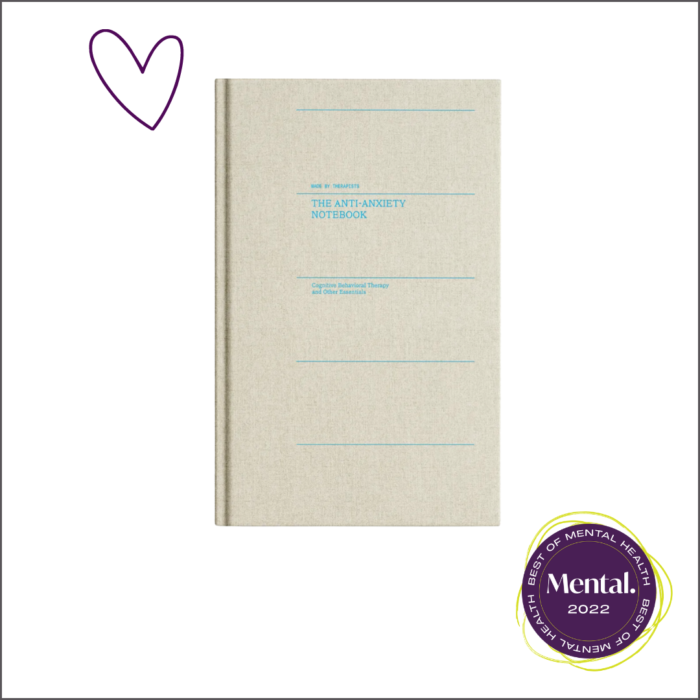 “Journaling can be a great way for people to manage anxiety,” says Julia Frew, M.D., assistant professor of psychiatry and vice chair of education, department of psychiatry, at the Geisel School of Medicine at Dartmouth Hitchcock Medical Center. “For generalized anxiety, a daily practice of ‘worry time’ can be effective in keeping worries contained to a specific time of the day rather than focusing on worries all day long. Some journals include prompts for challenging negative thoughts or moving toward a place of greater acceptance.”
“Journaling can be a great way for people to manage anxiety,” says Julia Frew, M.D., assistant professor of psychiatry and vice chair of education, department of psychiatry, at the Geisel School of Medicine at Dartmouth Hitchcock Medical Center. “For generalized anxiety, a daily practice of ‘worry time’ can be effective in keeping worries contained to a specific time of the day rather than focusing on worries all day long. Some journals include prompts for challenging negative thoughts or moving toward a place of greater acceptance.”
It’s one of the reasons we chose this particular notebook, created by therapists and based on the principles of cognitive behavioral therapy, a classic type used to treat anxiety. Guided entries, structured exercises, and therapist tips help challenge thought patterns.
Activity Book
The Big Journal For Anxious People, $13.29
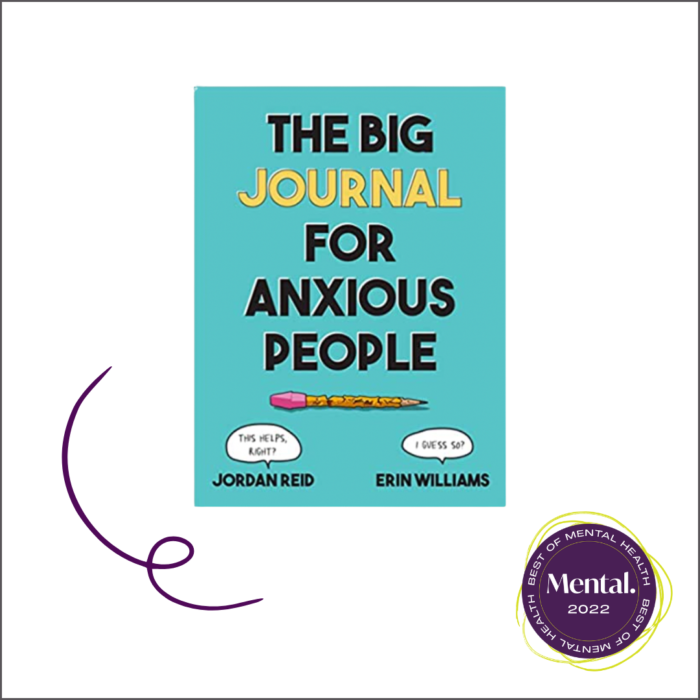
If serious or novel-length entries aren’t your jam—and if you happen to appreciate potty-mouth approaches to mental health (authors Jordan Reid and Erin Williams equating journaling in the morning to “taking a much-needed poop”)—this is the digest-size activity book for you. You’ll laugh (when celebrating the “suckiest” parts of you), you’ll draw (the tattoo you shouldn’t get till you’re calm and rational), you’ll collage (art therapy!).
Plus, you get to fill out fun, single-line lists, including a “teeny-tiny bucket list” of small, feel-better things you can tackle in a day, weird things about your personality (because, as the authors attest, normal is boring—big facts), and easy things you can do to boost your mood (a comfy thing, a thing to watch, a thing to squeeze, all the things).
Best Journal for Mood Tracking
Mood Tracker Planner, $16.99
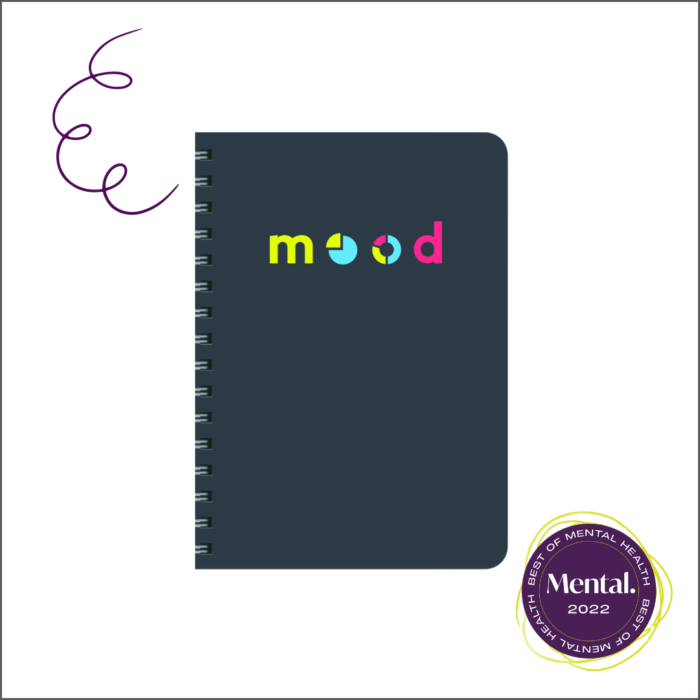
“Individuals with lots of mood fluctuation over time can find it helpful to track or chart their moods,” says Dr. Frew. “Tracking mood symptoms can help you notice patterns in your mood or triggers for mood changes. Sharing a mood tracking log or journal with a therapist or doctor can also be helpful in making an appropriate diagnosis and understanding the relationship between triggers and mood symptoms.”
One 2020 study review published in BMC Psychiatry found “distant mood monitoring” to be effective in decreasing depression symptoms in patients with depression and bipolar disorder, with 86.5 percent of patients considering it helpful. Another study, in the Journal of Experimental Psychopathology, pointed out that another benefit of mood tracking is helping people understand what their “normal” mood fluctuations are, so they can recognize “when their mood goes outside this range.” And finally, studies have shown a link between working memory in both bipolar disorder and major depressive disorder, so locking down details in a journal can be helpful.
Which brings us to this cute spiral. Both a mood tracker and a daily planner, it includes weekly goals, to-do lists, and provocative quotes (no “live, laugh, love” here). You color-code your AM and PM moods in a tracker circle, then you can fill in the positive, neutral, and negative things that impacted your mood that week in a chart. “It isn’t too overwhelming,” says one Mental reader with bipolar disorder. “I like the at-a-glance design, and it has stickers!”
The book has helped one Amazon reviewer “identify triggers and lifestyle choices that affect my mood and energy.” Another—with borderline personality disorder, panic disorder, and PTSD—exclaimed “I love this!!! This little planner does wonders to keep me accountable, on track, and mindful of my ever-changing moods and perceptions.” Not to mention it’s cheaper than two Starbucks lattes…and worth a lot more.
Best Journal for Coping With Trauma
Elan Publishing Field Book, $10.99 for 5
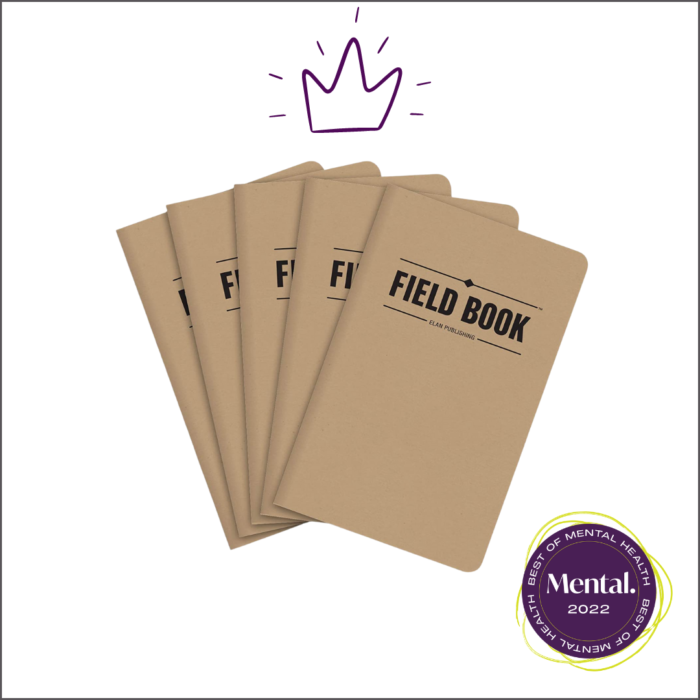
“I think journaling is particularly helpful when someone who has a trauma history or who experienced a traumatic event all of a sudden gets triggered,” says Dr. Davis, who specializes in PTSD and anxiety disorders. “They’re feeling anxious or sad or angry–they’re not really sure how to process it. Studies show that people process things better with the act of writing. It also can be a relief to just take something out of your head and bodily sensations and just put it out in the universe, on paper.”
Writing in that triggered moment, or at night before bed–when you want to leave your anxieties elsewhere—can help you make sense of your feelings. Instead of getting broad and “writing about your global trauma, which can be overwhelming,” says Dr. Davis, “keep it relegated to events, specific feelings, and moments. Write about something that happened to you that day. Maybe you bumped into someone, or watched a film that triggered you. Or something was in the news and all of sudden you feel a certain way.
“You might ask: What just happened? Why am I thinking about this? Is this an anniversary reaction?” Dr. Davis continues. “You may write: I just went out and someone reminded me of my abuser. Or I went to a party and I just began to get anxious, and I’m feeling unsafe. This helps you put an event into perspective.” A 2019 study found that expressive writing reduced stress and improved resilience to trauma in patients who had experienced a traumatic event in the last year.
However: Dr. Davis cautions against “over-journaling.” There’s no need to delve deeply into every bad thing that has ever happened to you in a single session. That can flood you with negative emotions. Try not to write for more than 10 to 15 minutes at a time—or less. “Even two or three minutes of journaling can help you begin to get perspective,” says Dr. Davis. “Any processing of traumatic events should be done in small doses and in a way that is tolerable.”
With that in mind, we like this little blank slate of a notebook because, at 3.5”x5.5”, we can limit ourselves to a page or two and avoid going overboard. It’s minimalist industrial-chic, and small and flexible enough to stash in a bag (or even fold into a back pocket), so we can write when the need arises. Plus, pages aren’t dated, so there’s no pressure to fill up every day. Dr. Davis suggests rotating between negative and positive entries—writing about triggering events one day, then a few things you’re grateful for next time.
Best Journal for ADHD
One Line a Day: A Five-Year Memory Book, $15.76
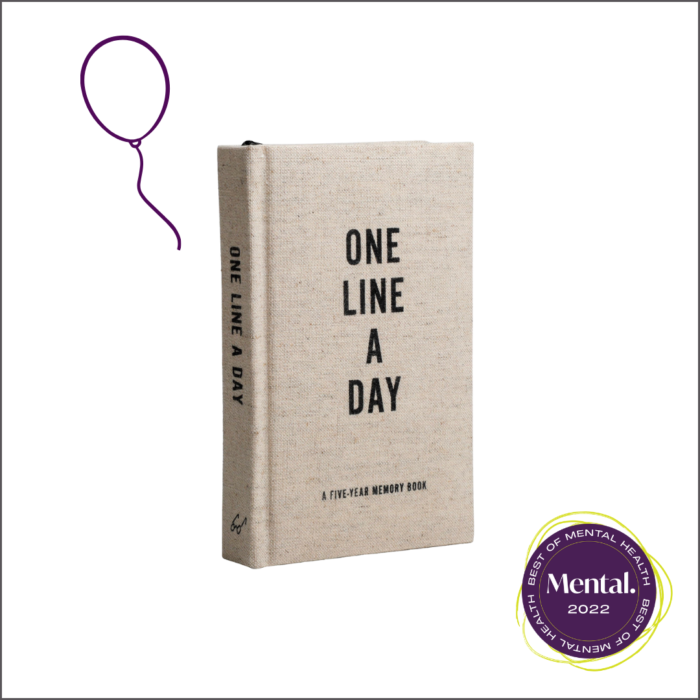
Not every person with ADHD finds journaling helpful. But because ADHD doesn’t always come alone–studies show that the disorder is often accompanied by anxiety and depression– someone with ADHD might find solace or self-awareness in the practice. Lesson one for journaling with ADHD: Keep it simple. “What I see a lot with folks with ADHD is that they feel like they have to journal something long and meaningful,” says Michelle Frank, Psy.D., director of the Enrich Relationship Center of Colorado and author of A Radical Guide for Women with ADHD. “And that they have to do it very consistently. And if that doesn’t happen, then they give up on the whole thing.”
For wannabe journalers, Dr. Frank recommends a “one line a day” practice with either an open-format or prompt style that you access as needed. “Every single day doesn’t have to have a ‘Dear Diary’ moment,” she says. “Adding pressure on oneself to perfect the journaling? That derails the whole thing, and then journaling becomes another source of shame and failure when it’s supposed to be a tool that helps you cope. We’re not trying to perfect coping.”
This ultra-simple, low-pressure, single-line journal takes away any manifesto expectations. You can write about the frustrations of distraction, a short list of goals for the day, or a happy moment that occurred. Whatever holds your focus in the moment.
Best Journal for Nondorky Gratitude
Papier Shine Foiled Gratitude Journal, $34
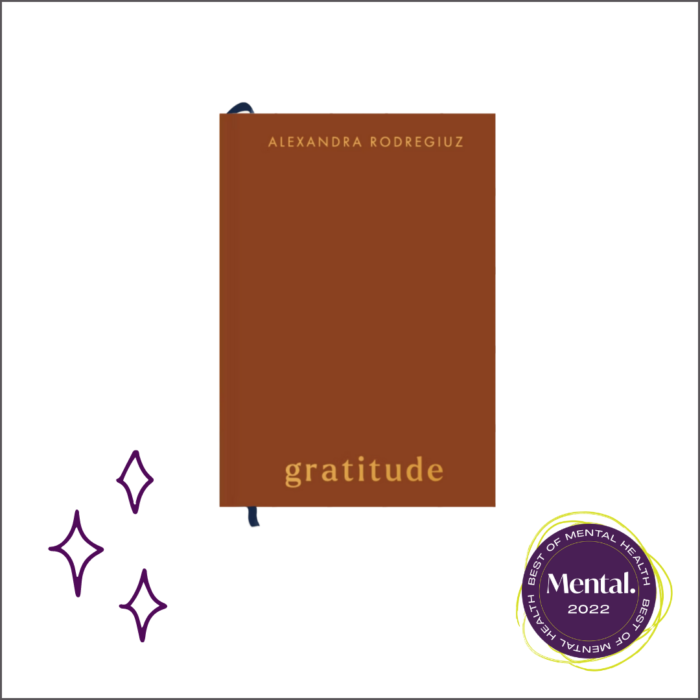
“You’ve got to be kidding me. That’s what popped in my head…and then came out of my mouth when a person I uber-respect suggested keeping a gratitude journal,” says one Mental writer. “Though a hard-nosed skeptic, I was also a bummer—and I was sick of being a bummer.” Some days it was harder than others to come up with multiple reasons to be grateful. But paring things down into micro-gratefulness moments proved enlightening.
“I’ve always thanked people IRL for things like letting me scoot by them in an aisle at the grocery store, but that was out of my mind as soon as I did it. Instead, I’d spend time ruminating on my problems,” she says. “Keeping the journal made me realize that I was a grateful person. That I appreciated others. That I was kind. That meant a lot at a time when I wasn’t thinking very positively about the world or myself.”
A 2016 study, among many others, touted the benefits of gratitude journaling. In this one, psychotherapy patients who wrote regular gratitude letters—that they weren’t required to send and most of them did not—”reported significantly better mental health” than patients who received therapy only or received therapy and did expressive journal writing. Other studies have proven that gratitude journaling not only helps someone recognize the positive, it even improves their immune system (!) and relationships, ramping up feelings of connection and commitment.
Because we’re just not “we’ve got an attitude for gratitude,” scripty-font peeps, this chic, tobacco-hued book is what we use for morning journaling. It’s simple, asking for three things you’re grateful for and three things you’re looking forward to each day. It also has a daily affirmation (not cringey, we swear!), which helps set a tone for approaching the coming hours.
Want more of the most-vetted products and tips for mental health? Sign up for our newsletter and get Mental in your inbox!
Check Out Our Other Best of Mental Health 2022 Categories
Don’t Tell Me to Calm Down (But I Probably Should)
I Just Cried (or: I Couldn’t Sleep)
Geek Out on Our Sources
MOOD-TRACKING JOURNAL
Gerrling B, Kelders SM, Kupka RW, et al. How to Make Online Mood-Monitoring in Bipolar Patients a Success? A Qualitative Exploration of Requirements. International Journal of Bipolar Disorders. December 1, 2021.
Van der Watt ASJ, Odendaal W, Louw K, Seedat S. Distant Mood Monitoring for Depressive and Bipolar Disorders: A Systematic Review. BMC Psychiatry. July 22, 2020.
Malik A, Goodwin GM, Holmes EA. Contemporary Approaches to Frequent Mood Monitoring in Bipolar Disorder. Journal of Experimental Psychopathology. October 6, 2012.
Soraggi-Frez C, Santos FH, Albuquerque PB, Malloy-Diniz LF. Disentangling Working Memory Functioning in Mood States of Bipolar Disorder: A Systematic Review. Frontiers in Psychology. April 26, 2017.
Delgado VB, Kapczinski F, Chaves ML. Memory Mood Congruency Phenomenon in Bipolar I Disorder and Major Depression Disorder Patients. Brazilian Journal of Medical and Biological Research. June 22, 2012.
TRAUMA JOURNAL
Glass O, Dreusicke M, Evans J, et al. Expressive Writing to Improve Resilience to Trauma: A Clinical Feasibility Trial. Complementary Therapies in Clinical Practice. February 2019.
ADHD JOURNAL
Figueiredo T, Lima G, Erthal P, et al. Mind-Wandering, Depression, Anxiety and ADHD: Disentangling the Relationship. Psychiatry Research. January 21, 2020.
Sahmurova A, Arikan S, Gursesli MC, Duradoni M. ADHD Symptoms as a Stressor Leading to Depressive Symptoms among University Students: The Mediating Role of Perceived Stress between ADHD and Depression. International Journal of Environmental Research and Public Health. September 4, 2022.
GRATITUDE JOURNAL
Wong YJ, Owen J, Gabana NT, et al. Does Gratitude Writing Improve the Mental Health of Psychotherapy Clients? Evidence from a Randomized Controlled Trial. Psychotherapy Research. March 2018.
Hass L. Can Gratitude Make Your Job More Meaningful? Greater Good Magazine. August 9, 2023.
Suttie J. Does Practicing Gratitude Help Your Immune System? Greater Good Magazine. August 9, 2021.
Bono G, Sender JT. How Gratitude Connects Humans to the Best in Themselves and in Others. Research in Human Development. July 18, 2018.

